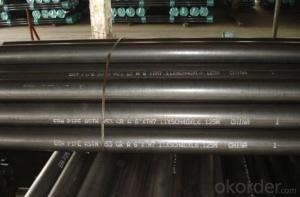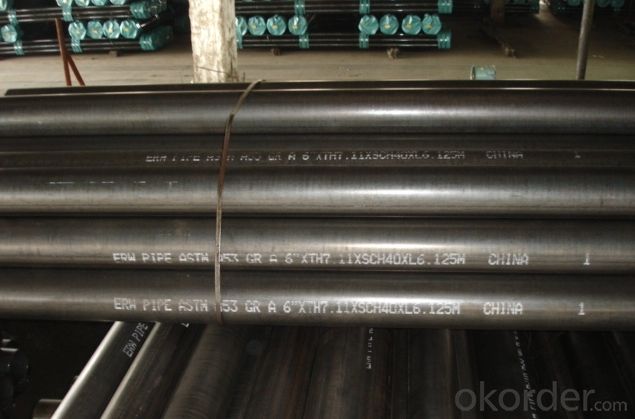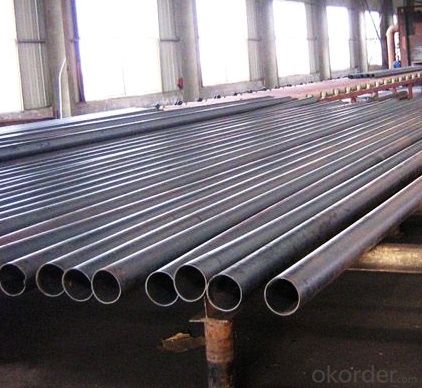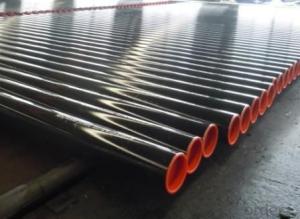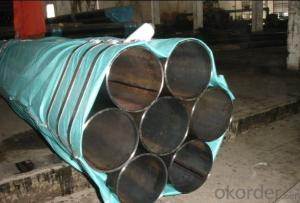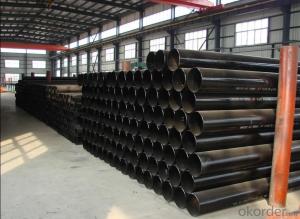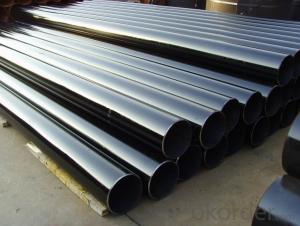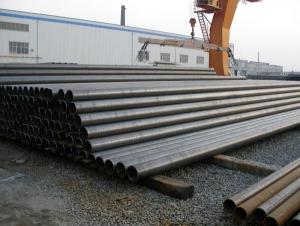Steel Pipe ERW API 5L
- Loading Port:
- China Main Port
- Payment Terms:
- TT or LC
- Min Order Qty:
- 25 m.t.
- Supply Capability:
- 9000 m.t./month
OKorder Service Pledge
OKorder Financial Service
You Might Also Like
1、Structure of Steel Pipe ERW API 5L:
ERW Steel Pipe is formed by drawing a solid billet over a piercing rod to create the hollow shell. As the manufacturing process does not include any welding, pipes are perceived to be stronger and more reliable. Historically seamless pipe was regarded as withstanding pressure better than other types, and was often more easily available than welded pipe.
2、Main Features of Steel Pipe ERW API 5L:
• High manufacturing accuracy
• More Higher strength
• Small inertia resistance
• Strong heat dissipation ability
• Good visual effect
3、Steel Pipe ERW API 5L Specification:
Standard | GB, DIN, ASTM ASTM A106-2006, ASTM A53-2007 |
Grade | 10#-45#, 16Mn 10#, 20#, 45#, 16Mn |
Thickness | 8 - 33 mm |
Section Shape | Round |
Outer Diameter | 133 - 219 mm |
Place of Origin | Shandong, China (Mainland) |
Secondary Or Not | Non-secondary |
Application | Hydraulic Pipe |
Technique | Cold Drawn |
Certification | API |
Surface Treatment | factory state or painted black |
Special Pipe | API Pipe |
Alloy Or Not | Non-alloy |
Length | 5-12M |
Outer Diameter | 21.3-610mm |
Grade | 20#, 45#, Q345, API J55, API K55, API L80, API N80, API P110, A53B |
Standard | ASME, ASTM |
1) Material:20#(ASTM A 106/A53 GRB.API5LGRB,GB),45#,16Mn,10#.
2) Specification range:OD:21.3-610mm,WT:6-70mm,length:6-12m or according to the requirement of clients.
3) Excutive standards:GB,ASME API5L.ASTM A 106/A53,Despite of the above standards,we can also supply seamless steel pipe with standard of DIN,JIS,and so on,and also develop new products according to the requirements of our clients!
4) Surface:black lacquered,varnish coating or galvanized.
5) Ends:Beveled or square cut,plastic capped,painted.
6) Packing:bundles wrapped with strong steel strip,seaworthy packing.
4、Packaging & Delivery
Packaging Details: | seaworthy package,bundles wrapped with strong steel strip |
Delivery Detail: | 15-30days after received 30%TT |
5、FAQ of Steel Pipe ERW API 5L:
①How is the quality of your products?
Our products are manufactured strictly according to national and internaional standard, and we take a test
on every pipe before delivered out. If you want see our quality certifications and all kinds of testing report, please just ask us for it.
Guaranteed: If products’ quality don’t accord to discription as we give or the promise before you place order, we promise 100% refund.
②How about price?
Yes, we are factory and be able to give you lowest price below market one, and we have a policy that “ for saving time and absolutely honest business attitude, we quote as lowest as possible for any customer, and discount can be given according to quantity”,if you like bargain and factory price is not low enough as you think, just don’t waste your time.Please trust the quotation we would give you, it is professional one.
③Why should you chose us?
Chose happens because of quality, then price, We can give you both.Additionally, we can also offer professional products inquiry, products knowledge train(for agents), smooth goods delivery,SGS test is available, customer inspection before shipping is welcome, third party inspection is no problem. We are trying to provide you best service and best quotation.
6、Steel Pipe ERW API 5L Images:
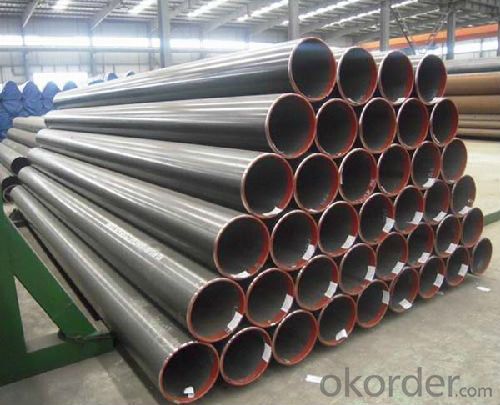
- Q: What is the role of steel pipes in the food processing industry?
- Steel pipes play a crucial role in the food processing industry by providing a reliable and hygienic means of transporting various fluids, such as water, gases, and food products. These pipes are resistant to corrosion and can withstand high temperatures and pressures, ensuring the safety and efficiency of food processing operations. They are used for conveying ingredients, cleaning agents, steam, and other necessary fluids, maintaining the integrity and quality of food products throughout the manufacturing process.
- Q: What is the diameter of the steel tube DN20?
- Pipe installation without conversion, because in the same standard in the same diameter connecting dimensions of the same nominal pressure level of the same, and the same material have the same diameter, the nominal diameter of the purpose is to facilitate connectivity
- Q: What are the different types of steel pipe coatings for marine applications?
- There are several types of steel pipe coatings used for marine applications, including fusion-bonded epoxy (FBE) coatings, three-layer polyethylene (3LPE) coatings, three-layer polypropylene (3LPP) coatings, and concrete weight coatings (CWC). These coatings provide protection against corrosion, abrasion, and other environmental factors, ensuring the longevity and durability of the steel pipes in marine environments.
- Q: How to establish a concrete-filled steel tubular column model in ANSYS?
- A two unit model or a composite unit model can be adoptedTwo units are constructed of steel tubes and concreteA composite unit may be either a fiber element or a section conversion attribute
- Q: How are steel pipes used in fire protection systems?
- Steel pipes are commonly used in fire protection systems because of their durability and resistance to high temperatures. They are used to transport water or other fire suppressants to sprinkler heads or fire hydrants, ensuring quick and efficient extinguishing of fires. The strength of steel pipes also allows them to withstand the pressure and force of water flow, making them a reliable choice for fire protection systems.
- Q: 25 of the steel pipe with 6 in charge of what is the difference?
- 25 of the steel pipe with 6 in charge of the difference:25 of the steel pipe refers to the DN25 tube, the outer diameter of 25mm; 6, in charge of refers to DN20 steel pipe, the outer diameter is 20mm.
- Q: Can steel pipes be used for conveying slurries or abrasive materials?
- Yes, steel pipes can be used for conveying slurries or abrasive materials. Steel pipes are known for their strength and durability, making them suitable for handling heavy-duty applications. They are resistant to wear, corrosion, and impact, which makes them ideal for conveying abrasive materials or slurries that contain solids or particles. Additionally, steel pipes can withstand high pressure and maintain their structural integrity, ensuring the safe and efficient transportation of slurries or abrasive materials.
- Q: How do you protect steel pipes from rusting?
- Steel pipes can be protected from rusting by applying a protective coating such as paint or zinc coating. Additionally, using corrosion inhibitors, maintaining proper drainage, and keeping the pipes dry can help prevent rust formation. Regular inspection and maintenance are also crucial to identify and address any potential issues before they escalate.
- Q: What are the common standards and specifications for steel pipes?
- The common standards and specifications for steel pipes include ASTM A53, ASTM A106, API 5L, and ISO 3183. These standards outline the requirements for the manufacturing, dimensions, and mechanical properties of steel pipes used in various industries such as oil and gas, construction, and transportation. Additionally, specific applications may have their own standards and specifications that need to be met for quality and safety purposes.
- Q: Are steel pipes suitable for oil and petroleum applications?
- Due to their exceptional strength, durability, and resistance to corrosion, steel pipes find extensive use in oil and petroleum applications. With the ability to endure high pressure and extreme temperatures, these pipes are ideal for the long-distance transportation of oil and petroleum. Moreover, steel pipes possess the added advantage of being able to withstand impact and vibrations, both prevalent in the oil and petroleum industry. Furthermore, their ease of welding and connecting facilitates efficient and cost-effective installation. In summary, steel pipes are the favored option for oil and petroleum applications, guaranteeing the secure and efficient conveyance of these valuable resources.
Send your message to us
Steel Pipe ERW API 5L
- Loading Port:
- China Main Port
- Payment Terms:
- TT or LC
- Min Order Qty:
- 25 m.t.
- Supply Capability:
- 9000 m.t./month
OKorder Service Pledge
OKorder Financial Service
Similar products
Hot products
Hot Searches
Related keywords
